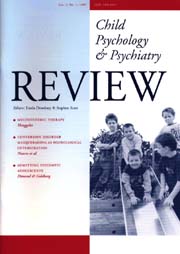Crossref Citations
This article has been cited by the following publications. This list is generated based on data provided by
Crossref.
Kroll, Thilo
and
Petermann, Franz
2001.
Förderung der sozialen und emotionalen Kompetenz bei krebskranken Kindern und Jugendlichen.
Kindheit und Entwicklung,
Vol. 10,
Issue. 1,
p.
36.
LeBlanc, Linda A.
Sautter, Rachael A.
and
Dore, Dawn J.
2006.
Clinician's Handbook of Child Behavioral Assessment.
p.
377.
Morris, Erin B.
Zhang, Bo
and
Bondy, Susan J.
2006.
Bullying and Smoking: Examining the Relationships in Ontario Adolescents.
Journal of School Health,
Vol. 76,
Issue. 9,
p.
465.
Camargo, Síglia Pimentel Höher
and
Bosa, Cleonice Alves
2009.
Competência social, inclusão escolar e autismo: revisão crítica da literatura.
Psicologia & Sociedade,
Vol. 21,
Issue. 1,
p.
65.
Oberle, Eva
Schonert-Reichl, Kimberly A.
and
Thomson, Kimberly C.
2010.
Understanding the Link Between Social and Emotional Well-Being and Peer Relations in Early Adolescence: Gender-Specific Predictors of Peer Acceptance.
Journal of Youth and Adolescence,
Vol. 39,
Issue. 11,
p.
1330.
Yu, Lu
and
Xie, Dong
2010.
Multidimensional Gender Identity and Psychological Adjustment in Middle Childhood: A Study in China.
Sex Roles,
Vol. 62,
Issue. 1-2,
p.
100.
Page, Timothy
Boris, Neil W.
Heller, Sherryl
Robinson, Lara
Hawkins, Shantice
and
Norwood, Rhonda
2011.
Narrative story stems with high risk six year-olds: Differential associations with mother- and teacher-reported psycho-social adjustment.
Attachment & Human Development,
Vol. 13,
Issue. 4,
p.
359.
Bowen, Natasha K.
2011.
Child-Report Data and Assessment of the Social Environment in Schools.
Research on Social Work Practice,
Vol. 21,
Issue. 4,
p.
476.
Kouvava, Sofia
Antonopoulou, Katerina
Zioga, Sofia
and
Karali, Chrysoula
2011.
The influence of musical games and role-play activities upon primary school children's self-concept and peer relationships.
Procedia - Social and Behavioral Sciences,
Vol. 29,
Issue. ,
p.
1660.
Webber, Kristina C.
Rizo, Cynthia F.
and
Bowen, Natasha K.
2012.
Confirmatory Factor Analysis of the Elementary School Success Profile for Teachers.
Research on Social Work Practice,
Vol. 22,
Issue. 1,
p.
77.
Camargo, Síglia Pimentel Höher
and
Bosa, Cleonice Alves
2012.
Competência social, inclusão escolar e autismo: um estudo de caso comparativo.
Psicologia: Teoria e Pesquisa,
Vol. 28,
Issue. 3,
p.
315.
Oberle, Eva
and
Schonert-Reichl, Kimberly A.
2013.
Relations among peer acceptance, inhibitory control, and math achievement in early adolescence.
Journal of Applied Developmental Psychology,
Vol. 34,
Issue. 1,
p.
45.
Oberle, Eva
Schonert-Reichl, Kimberly A.
Hertzman, Clyde
and
Zumbo, Bruno D.
2014.
Social–emotional competencies make the grade: Predicting academic success in early adolescence.
Journal of Applied Developmental Psychology,
Vol. 35,
Issue. 3,
p.
138.
Ralph, Leslie E. R.
and
Epkins, Catherine C.
2015.
Aspects of Girls’ Friendships: Practice Implications for Internalizing Problems.
Child & Youth Care Forum,
Vol. 44,
Issue. 3,
p.
395.
Whiteside, Stephen P. H.
McCarthy, Denis M.
Sim, Leslie A.
Biggs, Bridget K.
Petrikin, Joshua E.
and
Mellon, Michael W.
2016.
Development of the Friendships and Social Skills Test (FASST): A Parent Report Measure.
Journal of Child and Family Studies,
Vol. 25,
Issue. 6,
p.
1777.
Ray, Glen E.
Washington, Robert
Cohen, Robert
Hsueh, Yeh
and
Zhou, Zongkui
2018.
The Relation of Reciprocated and Nonreciprocated Friendship Nominations to Peer Social Competence for Chinese Elementary School Children.
The Journal of Genetic Psychology,
Vol. 179,
Issue. 6,
p.
385.
Prino, Laura E.
Pasta, Tiziana
Longobardi, Claudio
Marengo, Davide
and
Settanni, Michele
2018.
From Their Point of View: Identifying Socio-Behavioral Profiles of Primary School Pupils Based on Peer Group Perception.
Frontiers in Psychology,
Vol. 9,
Issue. ,
Blackwell, Courtney K
Lai, Jin-Shei
Kallen, Michael
Bevans, Katherine B
Davis, Matthew M
Wakschlag, Lauren S
and
Cella, David
2022.
Measuring PROMIS® Social Relationships in Early Childhood.
Journal of Pediatric Psychology,
Vol. 47,
Issue. 5,
p.
573.
Kouvava, Sofia
Antonopoulou, Katerina
Kokkinos, Constantinos M.
and
Voulgaridou, Ioanna
2023.
Psychometric properties of the Greek translation of the Friendship Quality Questionnaire.
Psychology in the Schools,
Vol. 60,
Issue. 4,
p.
985.
Chen, Bixia
2023.
Influence of cooperative learning on learners’ motivation: the case of Shenzhen primary school.
Education 3-13,
Vol. 51,
Issue. 4,
p.
647.


